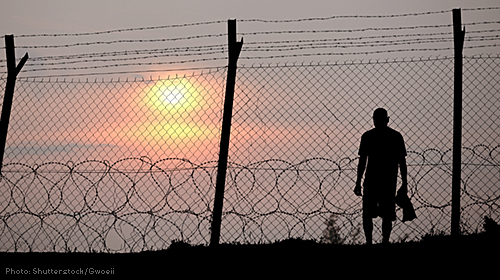Border Crisis Prompting New Xenophobic Drumbeat for an Old Disgrace—Detention Camps


This piece originally appeared at .
Seventy-two years ago, U.S. military officials labeled Japanese-Americans "an enemy race." Because they were Japanese-Americans, the government locked members of my family—along with many other men, women, and children—in prison camps behind barbed wire.
That family history makes it especially painful for me to watch our country marching refuge-seeking Central American children and families down a similarly shameful path. Too often, the United States violates its principles in response to the vocal racism and xenophobia of some and the silence of too many who watch it happen.
The federal government's World War II Japanese-American families was fueled by decades of racist agitation against Japanese immigration. When the war came, some white Americans saw it as a chance to take back a country they felt was being overrun by an alien race. As farmer Austin Anson told The Saturday Evening Post in 1942, "We're charged with wanting to get rid of the Japs for selfish reasons.... We do. It's a question of whether the white man lives on the Pacific Coast or the brown men. They came into this valley to work and they stayed to take over."
Others were quite clear about what they wanted to happen to these "Japs" once arrested. In early 1942, Nevada Gov. Edward Carville wrote to military authorities that while he was willing to accept construction of a Japanese-American concentration camp in his state, "I do not desire that Nevada be made a dumping ground for enemy aliens to be going anywhere they might see fit to travel."
Today, a similar xenophobic drumbeat is sounding against the Central American families and children seeking refuge in the United States. Rush Limbaugh recently called the children "." Ann Coulter accused immigration-reform advocates of "working feverishly to." Rep. Phil Gingrey, R-Ga., a physician, asserted that the families and children fleeing violence south of the U.S. border pose "grave public health threats" to Americans. And during the now-infamous in Murrieta, Calif., one man waved a sign reading: "Murrieta is not a dumping ground for the federal government."
Of course, history never repeats itself in exactly the same way. The Japanese-Americans incarcerated during World War II were generally long-term residents and U.S. citizens. In contrast, the latest targets of this country's special blend of racism and xenophobia are new arrivals—particularly women and girls—fleeing horrific violence in Central America. According to the United Nations' Special Rapporteur on Violence Against Women, violent deaths of women in Honduras increased 263.4 percent between 2005 and 2013. And asylum requests from Honduran, El Salvadoran, and Guatemalan nationals have increased 712 percent in Mexico, Panama, Nicaragua, Costa Rica, and Belize since 2008, according to the U.N.'s refugee agency.
In Central America, gangs act with impunity. To take just one example: Ms. L, a preteen, was dragged from her home and raped by more than a dozen gang members, according to the Jesuit ministries in Honduras who work in partnership with groups assisting girls victimized by violence. After reporting the gang rape to the police, her family began to receive death threats. When a shelter declined to take Ms. L in because it could not protect her or any of the other shelter residents from gang violence, she fled the country.
Central American families need to have their claims for asylum or other legal immigrant statuses carefully evaluated in fair hearings, with counsel, before immigration judges. Indeed, the American Civil Liberties Union recently filed a lawsuit arguing that every child should receive legal representation in these hearings. Instead, growing numbers of women and children—many of whom have of violence, sexual assault, or even death—are being locked in remote detention facilities, far from immigration attorneys, and rushed through the process. This often happens without these women and children ever receiving a chance to tell their stories to an asylum officer or a judge.
Their detention is unnecessary. People across the political spectrum have begun to express the view that alternatives to detention are more and , and far less costly.
Yet, just as the Roosevelt administration used the language of "military necessity" to accommodate the demands of anti-Japanese racists on the West Coast, Obama administration officials have requested funding for a massive increase in "family detention" of Central American parents and children. The Obama administration did so not because these young women and children pose a risk to public safety, or because such mass detention is necessary to ensure particular individuals show up for their immigration court hearings. Instead, the current administration did this to "send a message" to other Central Americans. As Homeland Security Secretary Jeh Johnson during a recent detention-facility tour, the existence of detention centers reserved for families with children "represents proof that indeed we will send people back" to the countries they are trying to escape.
That is a shameful message indeed—and one that future generations will rightly condemn. To stay on the right side of history, the Obama administration must halt its expansion of family detention.
This piece was originally published by The National Journal magazine online at page. The Next America project explores the political, social and cultural implications of the nation's ongoing and massive demographic shifts.
Learn more about immigrant detention and other civil liberty issues: Sign up for breaking news alerts, , and .
